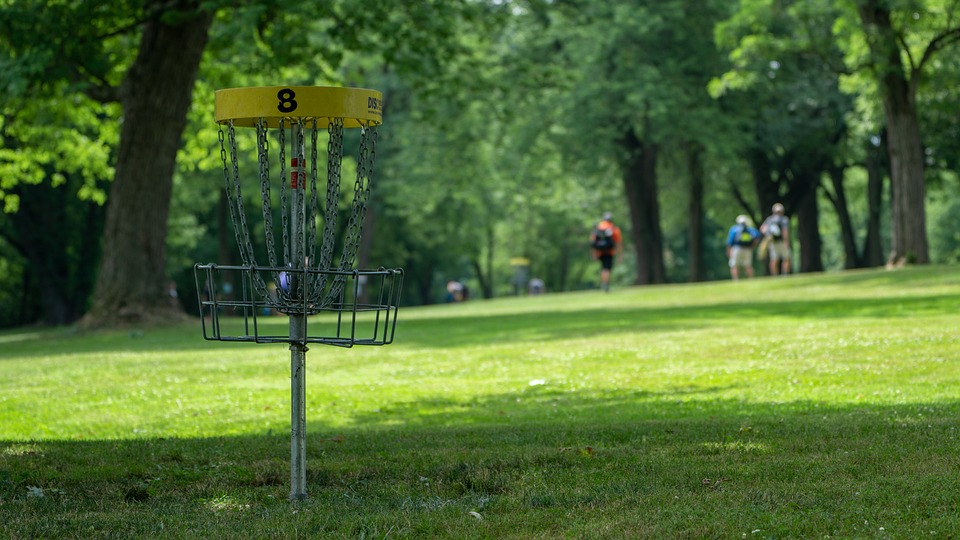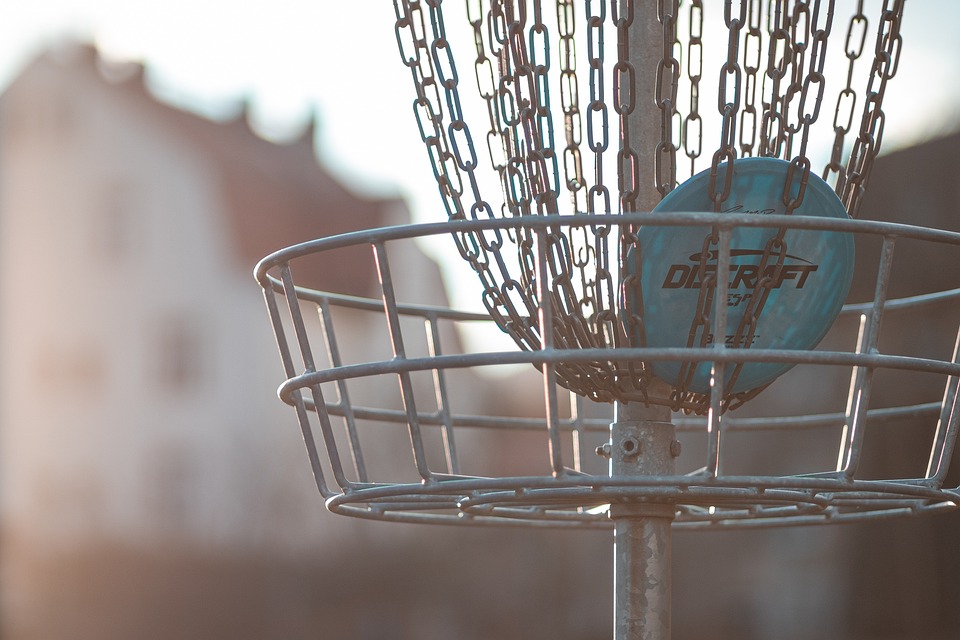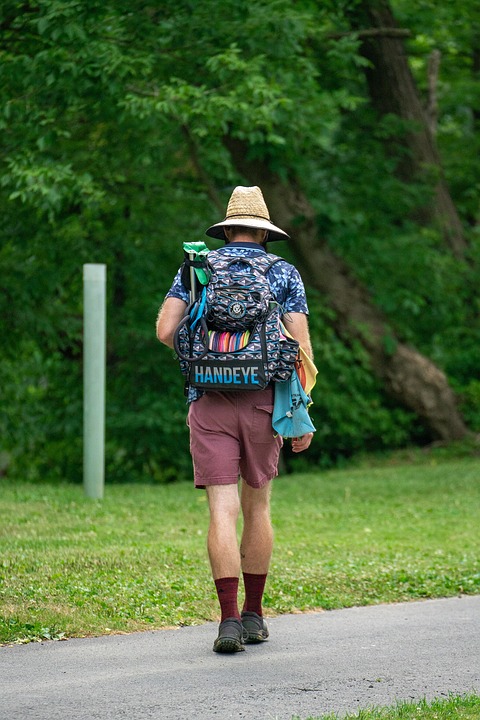Focus on the game: Gregg Barsby discusses growth of disc golf, his own series and what he still wants to accomplish
By MarKing, @markingofdg on Instagram
It can be challenging, and It can also be relaxing. It can be played solo, and it can also be a fun way to connect with friends and family. It’s relatively cheap to get started and most courses are free to play. It’s usually outdoors and no two courses are the same. And, it’s socially distanced by nature.
It’s no wonder disc golf has continued to gain in popularity over the years, and that trend wasn’t hindered by the pandemic.
More than 50 million rounds of golf were played around the world in 2020, according to a study conducted by UDisc.com. That’s more than 135,000 disc golf rounds per day.
The Professional Disc Golf Association also saw an increase of 26,632 new players in 2020, marking a 13th straight year of growth.
The sport recently drew global attention after James Conrad’s incredible 247-foot throw-in on the 18th hole of the 2021 PDGA World Championships to force overtime. The crowd in Ogden, Utah, erupted as Conrad charged down the fairway in celebration. Conrad’s “shot heard around the world” is both a viral and defining moment in the sport’s history.
Gregg Barsby, the 2018 PDGA World Champion, has been a pro player for nearly 20 years, and has witnessed disc golf blossom into one of the fastest growing sports in the world.
The Grass Valley native got his start at Condon Park as a teen in the 1990s, and parlayed his countless hours on the course and passion for the sport into a career that has taken him all over the world.
Fresh off his sixth place finish at the 2021 World Championships, I took some time to talk with the No. 20 ranked men’s player in the world about the sport’s popularity, his maturation as a competitor and what he still hopes to accomplish.
FORD: After that James Conrad throw-in on the 18th to force sudden death at the World Championships, the crowd went wild. It seemed indicative of the excitement around the sport and how the sport has grown in popularity. Do you agree?
BARSBY: For sure. I think that through the pandemic a lot of people were exposed to the game because all the other sports weren’t available. So, there’s been a ton of growth as far as new players and people coming into the sport.
And, I mean, there’s not much you can say about what James (Conrad) did. It was unreal. The energy on site was electric. People were hugging people they didn’t know. It was one of those shots that really brings people together, and I think more than anything else it’s a catalyst. A shot like that brings media attention, all these outlets are picking that shot up.”
FORD: You’ve been a pro for awhile now. How has the sport grown over the years?
BARSBY: When I started playing pro I was 15, I was still going to Nevada Union. Back then, there was not really even a tour. When I started touring in 2007, there were maybe a dozen people who were on tour. There wasn’t the amount of people or companies or sponsors that were involved. It was still very much a backyard, grassroots sport. The growth has come from, I think, people that enjoy the game and can see it for what it is.
Besides just being a recreational sport, I think people have fallen in love with it. You’re always in constant pursuit of another level, or being able to control your disc, and getting that empowerment from making great shots or creating great shots. I think people have really fallen in love with it because it’s so much fun to play, it’s relatively inexpensive to get involved and most the courses we play are free. So, the accessibility is there and with the way the world is, things being very expensive, I think it’s a great alternative to a lot of other sports.
By MarKing, @markingofdg on Instagram
FORD: As someone who has been a part of the sport as it grew from those early grassroots years, what have been some of the turning points for you along the way?
BARSBY: I think some of the big stepping stones for me were going to Europe and experiencing some different cultures because of the game. It wasn’t that I just went to Europe to experience it, I had a goal in mind, a mission when I first went in 2014. I got top 10 at the European Masters that year and started to make a name for myself across the pond as well. I was able to use disc golf as a platform and catalyst for going to these different places, experiencing different cultures and meeting people from all over the world…
And, obviously I’ve had some great finishes. I’ve got a bunch of top fives in majors, but more than anything when I won the World Championship in 2018, that was a real catapult for what I was doing. I had already been touring relentlessly, pushing for months on end in Europe, doing clinics for months on end and I think winning the championship really put a statement on what I had already been doing, and was more of a validation point.
And, I’ve experienced a little bit of growth since then. I’ve been able to host my own series (Barsby Battle Series) of events. I’ve hosted around 70 of my own events with my girlfriend since I won the World Championship. It kind of gives me the opportunity to meet my fans and my friends all over the place. That was the big one, though. Winning the World Championships is life changing.
FORD: When you look back to your teen years playing at Condon Park, did you ever think this would be your life? That disc golf would pay the bills and take you all over the world?
BARSBY: I always wanted it to be. That’s the big kicker, right? When you’re passionate about what you’re doing, you’re really the only person that can stop it from happening. Over time, I’ve learned from my mistakes, I’ve been able to maneuver through an emerging niche sport and build a fan base, and a friend base — which is more important. If you don’t have the friend base, it’s hard to build a fan base. Your friends are going to promote you through word of mouth and that’s still the strongest form of marketing.
I love thinking back on those times, and thinking back to the people who said I was not going to be able to do this, because I’ve proven them wrong and proven myself right, which is a good feeling.
It doesn’t come easy. Some guys win when they are young, but I feel like having the experience of being on the road for so long, and then finally achieving that ultimate goal of winning the World Championships was more of a reflection and introspective point for me, where I could see that all of the time I put in was really worth it. Now, I’m at a point where I’ve kind of got to make this count. In athletics, you only have a certain amount of time to capitalize on your successes. And, that’s what I’ve been focused on doing.
FORD: How much longer do you think you can compete at this high of a level?
BARSBY: I can see myself playing at a high level until probably my mid-40s. If I can keep my mind and body healthy, I don’t see there being an issue. There are really good players in their 40s that can still compete.
With the pro tour, it’s kind of morphing and some of the courses are getting longer. I’m not known as a very long thrower anymore. I mean I can throw a long way, I can throw 500 feet accurately, but some of these guys can throw a really long way and they have been setting up some of the courses for those long bombers. But, I think I can be competitive in certain arenas into my mid-40s, but like anything, there are certain courses that cater to the game I like to play and other courses where it doesn’t really cater to me too well. As the years go on I think I’ll be able to be a little more definitive in which events i want to play and where I want to spend my energy. Disc golf is a lot different from golf in the sense that our courses vary dramatically. We’ll play on a traditional golf course one weekend, then the next weekend, we’ll be in the tight woods, in the forest.
FORD: What is it about Nevada County that produces high-quality disc golf talent?
BARSBY: We just have a rich history of the sport where we’re from. You know, we’ve got hall of famers in town like Johnny and Geoff Lissaman and Michael Travers. He installed the course in Condon Park in, I think in 1992, and I found a disc in 1993 when my parents moved in across the street. I was brought into this kind of underground culture, and back then it wasn’t as much a social sport, it was more just people who had a love for throwing the disc. We have good mentors in Grass Valley. There are a lot of players that know how to play because, again, we’re rich in history. We were in early and we had a lot of good players in town.
FORD: Tell me about some of the events you host?
BARSBY: We host a slew of different style events, but we mostly do PDGA C Tier events, and we host those on the road in between my tour stops. Players come out, get a demo, a clinic, they play a round, players get a rating, and then they get a custom disc and a whole bunch of swag. We try to make it memorable. We founded the (Barsby) Battle Series on being an entry level way to get your feet wet, and as kind of like a stepping stone to bigger events.
FORD: You recently moved to Texas. What took you to the Lone Star State?
BARSBY: I had talked to my dad about it maybe six years ago, and this was in the throes of touring a bunch. There was about four or five years in a row where I spent 300 days on the road…
From my house here in Tyler, I can get to 10 states within 10 hours. So as far as hosting events and also promoting my line of discs and also the company that I work for promoting my name and my events, I can get to a lot of places. Whereas in California, it’s a 35-hour drive to get to the Midwest.
Also, the scene out here is insane. Houston and Austin both have tens of thousands of disc golfers. There’s multiple clubs in each of these cities. There’s a much bigger scene out here as far as the amount of courses you can play.
FORD: At this stage of your career, is it all about winning the big tourneys?
BARSBY: Totally. The pro tour has been doing a good job of not only promoting the sport but promoting the players as well. They have really nice events and run a super clean show.
At the big events, the cream really does rise to the top, and it really all depends on where your head space is. And that’s where my head has been focused, on the biggest events and on the biggest stages. Sixth place (at Worlds) isn’t exactly what I really wanted, I would have loved to be in the top five, but I did finish higher than the No. 1 player in the world, which was cool. There was a bunch of good players that I beat out at that event. They’ve been beating me all year and then it came to the Worlds and I shot a really good game. But there’s always room for improvement.
The US Open is the one I haven’t won and it’s actually the lowest finish of any of my majors. That’s the one I need to grit my teeth, buckle down and sharpen my skills come early October.
FORD: What would you say to people who dream to be a pro disc golfer?
BARSBY: I would tell them to stay off social media and focus on the game. I think social media is an important component in building your brand, but it’s more important to focus on the things you can control, which is the disc. Just practice hard. And don’t let anyone tell you, ‘you can’t do it.’ Because, ultimately, it’s going to be you who makes that decision.
To contact Sports Editor Walter Ford, email [email protected]





